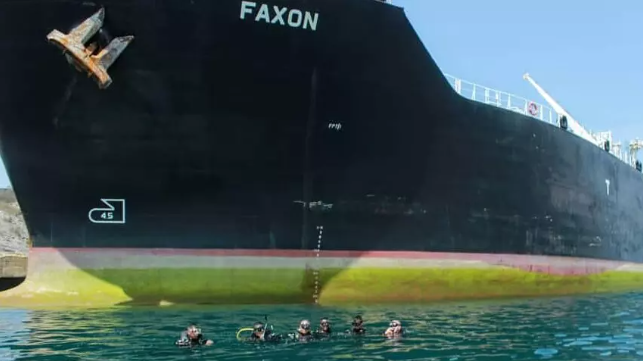Tanker Carrying Iranian Fuel for Lebanon Arrives in Baniyas

The Iranian product tanker Faxon has arrived at an offshore loading terminal in Baniyas, Syria to discharge a cargo of fuel for energy-starved Lebanon, satellite data consultancy TankerTrackers.com announced Tuesday. The vessel is carrying about 33,000 tonnes of gasoil, as promised by the Iranian-backed militant group Hezbollah, which organized the shipment.
As Iranian shipping and petroleum products are heavily sanctioned by the United States, the vessel did not dock directly in Lebanon. Instead, it headed to Syria, where the government is already under U.S. sanctions. Syria already receives regular deliveries of Iranian oil and petroleum products at its Baniyas refining complex, and there are few avenues for the U.S. Treasury to apply further pressure to the internationally-isolated regime in Damascus.
From Syria, the fuel cargo will be delivered overland to Lebanon by truck, according to TankerTrackers.com.
BREAKING, VISUAL CONFIRMATION: The Iranian handysize tanker FAXON (9283758) is discharging 33,000 metric tons of gasoil. Unable to deliver directly by sea to Lebanon due to sanctions, the vessel went instead to Baniyas, Syria for land transfer. Shall require 1,310 truckloads. pic.twitter.com/Z2kL8wyuTE
— TankerTrackers.com, Inc. (@TankerTrackers) September 14, 2021
The consultancy has identified two more Iranian vessels that are likely scheduled to deliver fuel using the same route. The second has not yet reached Suez, and the third is still loading at a terminal in Iran, TankerTrackers.com reported. The firm has released the identities of the vessels to its paying clients only.
On Monday, Hezbollah Secretary-General Hassan Nasrallah announced that the first shipments of Iranian fuel will begin arriving from Syria on Thursday. "It is assumed that the transportation of this [fuel] . . . will begin next Thursday to the Baalbek region," he said.
Nasrallah confirmed that the decision to divert the tanker to Baniyas was taken because of American sanctions measures. The Lebanese government has been at pains to demonstrate that it has not approved the shipment and has not facilitated any transactions with Iran; U.S. sanctions prohibit virtually all international transfers involving Iran's banking sector. In a televised address, Nasrallah said that the tanker was headed to Syria to make sure that the Lebanese government would not be "embarrassed" or penalized because of the transaction.
The shipment places Lebanese authorities in a difficult position. Hezbollah is by far the most powerful political entity in Lebanon, and its wide-ranging influence is bolstered by a militia force that is larger than the country's official military. The group's close ties with Iran and its aggression towards Israel have landed it on the U.S. foreign terrorist organization (FTO) list, and its fuel shipment deal is a clear breach of American sanctions.
However, Lebanon needs the fuel: it faces an extreme energy shortage brought on by economic collapse and rampant inflation. It has few other short-term options to source enough petroleum for motorists, truckers and power plants. Many of the country's gas stations have run dry; fuel supplies are closely rationed; and rolling blackouts have become the norm as its two primary powerplants run out of diesel.
In Jiyeh, south of Beirut, one local mosque has begun holding prayer services at a gas station where cars are parked in a three-mile tailback. The drivers are waiting round the clock for their turn to fill up and cannot leave to pray if they wish to keep their spots, so the mosque has brought prayer services to them, according to the AP.
